Best Practices for Managing Automotive Warranty and After-Sales Services
- February 15
- 10 min

AI in warranty management in automotive warranty claim processing systems simplifies review and approval processes while greatly improving accuracy and efficiency. This progress is essential in an industry where automating warranty claim verification is not only a key part of customer service but also a strategic asset. It plays a substantial role in driving brand revenue, building a strong reputation, and fostering customer loyalty.
Key Takeaways on AI in Automotive Warranty Management
Automotive warranty management involves the administration of claims that are made under the manufacturers’ warranty policies. It covers a broad spectrum of activities, including the initialization of claims, assessment of product failures, validation of warranty coverage, and the authorization or rejection of claims. In a sector characterized by complex products and a high volume of transactions, managing these tasks with precision and speed is paramount. That’s where AI steps in, transforming traditional approaches to automotive warranty management through automation, data analysis, and predictive capabilities.
Warranty management in the automotive industry serves as a critical point of interaction between the manufacturer and the customer, often influencing the latter’s satisfaction and loyalty. Effective automotive warranty management ensures compliance with regulatory standards and helps identify recurring issues, thereby guiding improvements in product quality and design. In this context, AI in warranty management aids manufacturers by providing tools for deeper insights into warranty data, predicting potential faults before they become widespread, and optimizing resource allocation for warranty service provision.
By leveraging AI in automotive warranty management, automotive companies are able to offer more responsive, transparent, and user-friendly warranty services. However, while AI’s contributions to enhancing warranty management are substantial, it’s important to recognize its limitations and the need for human oversight. This balance between technological advancements and human expertise forms the foundation of an efficient and reliable warranty management system in the automotive industry.
The deployment of AI technologies is transforming the way automotive companies handle warranty claims, detect fraud, and use data analytics to predict future issues and costs. Below is a detailed exploration of how AI is being utilized in these areas.
One of the primary applications of AI in automotive warranty management is in the processing of warranty claims. Traditionally, this process has been labor-intensive, prone to human error, and time-consuming.
How can AI improve warranty claims processing? AI, through machine learning algorithms and natural language processing, can automate the review of claims documents, extracting relevant information, and making initial determinations on claim validity. This AI warranty automation reduces processing times, allowing for quicker responses to customers.
Automotive warranty claims processing with AI-powered warranty solutions continuously learn from each claim, improving their accuracy and efficiency over time. They can also handle a high volume of claims simultaneously, ensuring consistency in decision-making, which is often a challenge in manual processes.
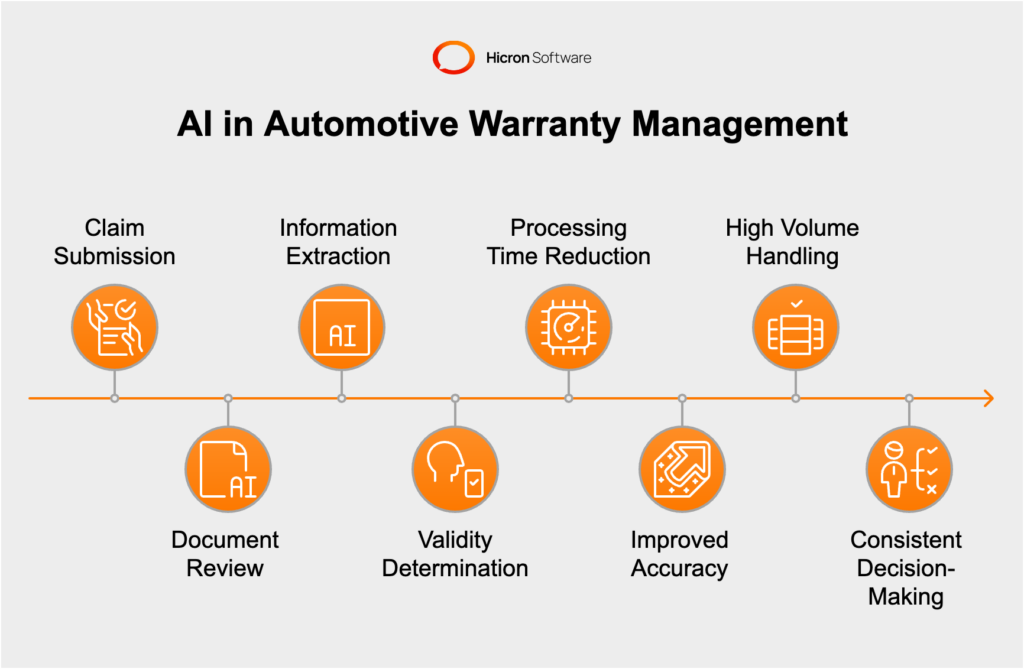
Fraudulent claims are a concern in warranty management, leading to unnecessary costs and resource drain.
How can AI prevent warranty fraud? AI in warranty management identifies and mitigates these risks through pattern recognition and anomaly detection techniques. By analyzing vast quantities of claim data, AI can identify unusual patterns or discrepancies that may indicate fraudulent activity.
For instance, if there’s an unusually high number of claims for a particular part from a specific region that deviates from the norm, AI warranty management systems can flag these for further investigation. This not only helps in curbing fraudulent activities but also in refining the criteria for detecting fraud, making the system more robust over time.
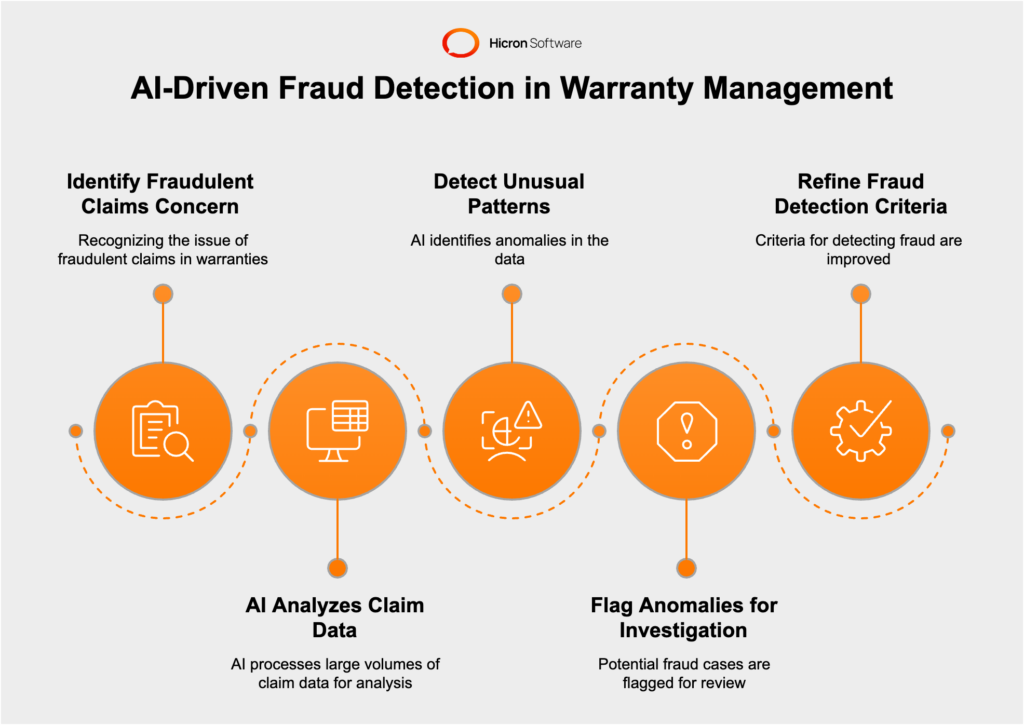
Perhaps one of the most revolutionary roles of AI in automotive warranty management is its ability to perform predictive analytics. By analyzing historical data, AI can predict future failure rates and potential warranty claim costs. This foresight allows manufacturers to proactively address issues before they escalate, potentially saving amounts of money in warranty claims.
AI warranty analytics and predictive analytics can also inform product design improvements and quality control measures, leading to better products and reduced warranty issues in the long run. Furthermore, by anticipating future trends, automotive companies can allocate resources more efficiently, ensuring that warranty service centers are adequately staffed and supplied to handle predicted claim volumes.
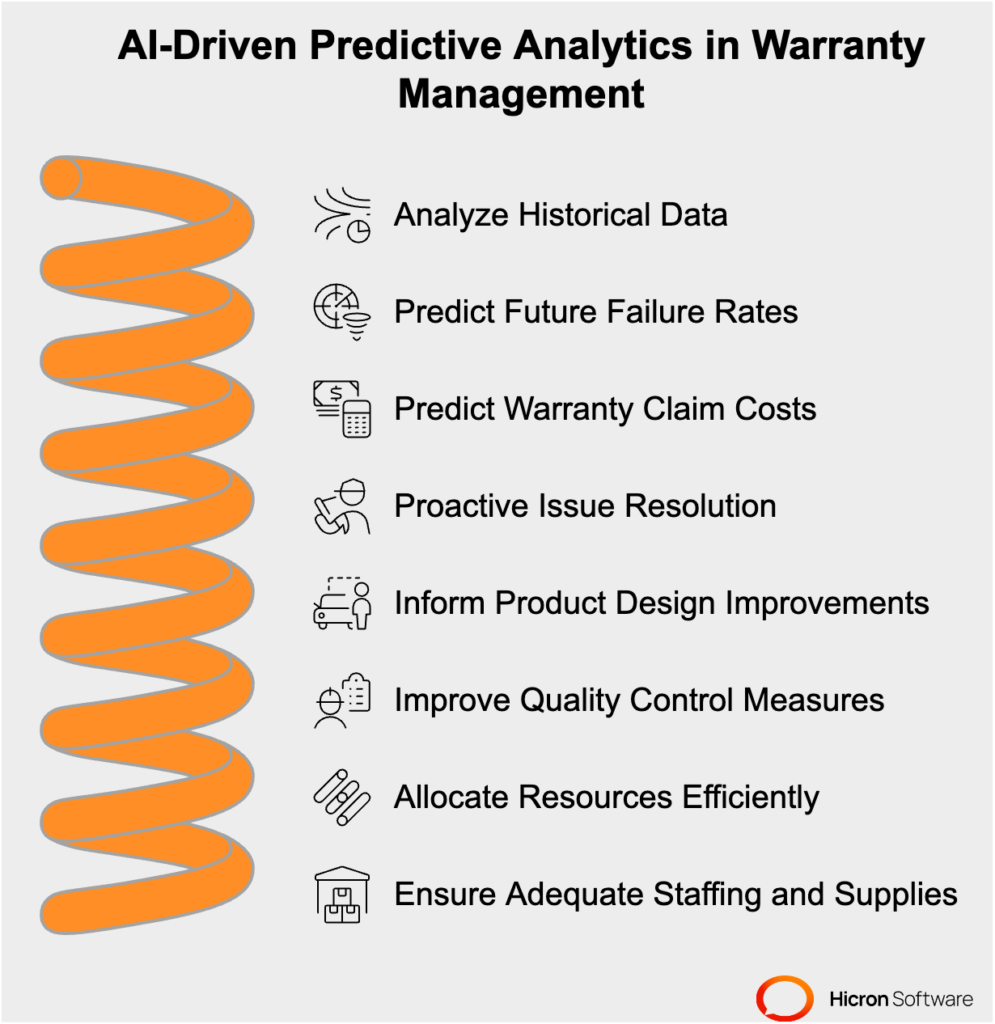
The integration of AI automotive warranty management is proving to be a game-changer. By automating claim processing, enhancing fraud detection, and utilizing predictive analytics, AI is not only streamlining operations but also providing strategic insights that help automotive companies improve their products and services.
However, it’s important to note that the successful implementation of AI requires a thoughtful approach that considers data quality, system training, and the ongoing role of human oversight to interpret and act on AI-generated insights. As AI technology continues to evolve, its role in automotive warranty management is set to become even more pivotal, driving efficiency, cost savings, and product improvements across the industry.
The adoption of Artificial Intelligence (AI) in warranty management has introduced a multitude of benefits that transform the operational landscape for automotive manufacturers and retailers. These benefits not only streamline internal processes but also enhance the overall customer experience, contributing to improved brand loyalty and profitability. Below is a discussion of specific benefits that highlight the impact of AI on warranty management.
AI in warranty management dramatically improves the efficiency and speed of processing warranty claims by automating tasks that previously required manual intervention. Through the use of algorithms and machine learning, AI can quickly scan, read, and interpret warranty claims and related documents, drastically reducing processing times.
This rapid analysis allows companies to resolve claims faster, thereby increasing throughput and enabling staff to focus on more complex cases or tasks that require human input. The ability of AI to learn and adapt over time means that it continuously refines its processes, leading to even greater efficiencies as the system matures.
Quick and accurate processing of warranty claims directly influences customer satisfaction. In an era where consumers expect swift and hassle-free service, AI’s capability to expedite claims processing aligns perfectly with these expectations.
Customers who experience speedy resolutions to their claims are more likely to remain loyal to the brand and may even become brand advocates, sharing their positive experiences with others. Additionally, AI-powered chatbots and virtual assistants can provide 24/7 support to answer customer queries related to warranty policies and claim statuses, further enhancing the customer service experience.
Implementing AI in warranty management can lead to cost reductions and improved profitability for automotive companies. By automating the claim processing workflow, businesses can lower their operational costs, as fewer human resources are required to manage the process.
AI’s ability to detect fraudulent claims with high accuracy prevents financial losses associated with such activities. Predictive analytics, another facet of AI, enables companies to identify potential product issues before they escalate into widespread problems, potentially saving millions in recall or warranty claim costs. Through early detection and resolution of issues, companies can also avoid the negative impact on brand reputation, which can have long-term financial implications.
Beyond immediate cost savings and efficiency gains, AI in warranty management contributes to longer-term benefits through predictive maintenance and product quality improvement. By analyzing warranty claim data, AI can identify patterns that indicate product faults or areas prone to failure. This information enables manufacturers to
Predictive maintenance not only reduces the frequency and severity of warranty claims but also contributes to the development of superior products, reinforcing a company’s competitive edge in the market.
The incorporation of AI into vehicle warranty management (or truck warranty management software) offers substantial benefits, including
all of which contribute to improved profitability and competitive advantage. AI technology continues to evolve. Its role in transforming warranty management processes becomes increasingly important. It promises even greater efficiencies and strategic insights for businesses in the automotive sector (and not only).
While the adoption of Artificial Intelligence (AI) in warranty management brings benefits, it also comes with its set of limitations and challenges. These barriers can impact the pace of AI integration and its effectiveness in transforming warranty processes. Understanding these hurdles is crucial for companies aiming to leverage AI in their operations.
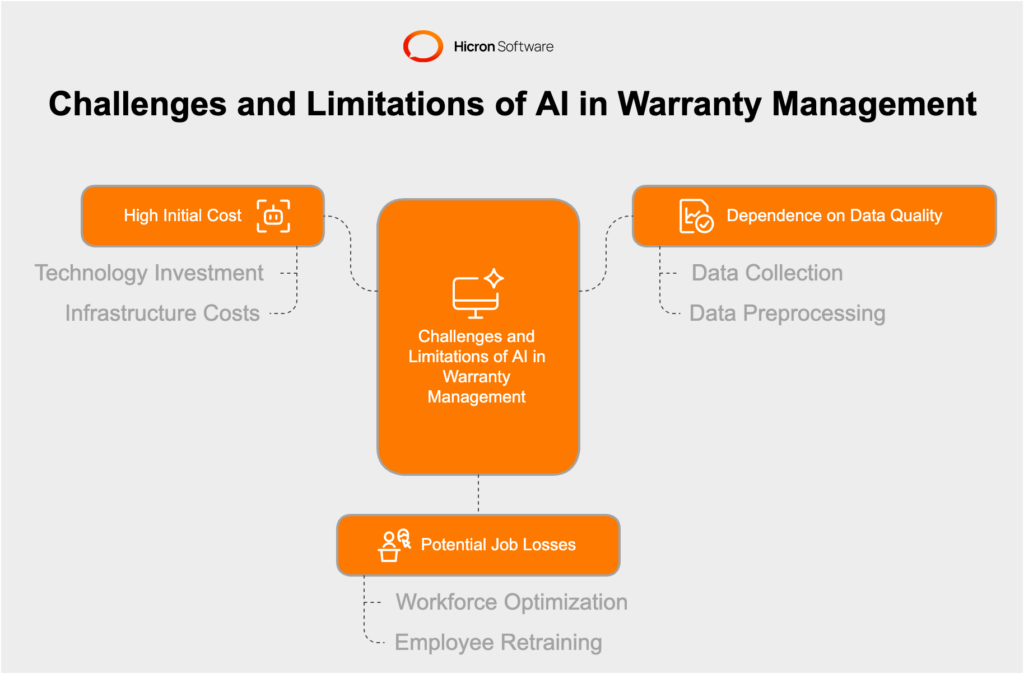
One of the barriers to implementing AI in warranty management is the high initial cost. Setting up an AI system requires financial investment in technology, infrastructure, and expertise. This includes
For many companies, especially small and medium-sized enterprises, these upfront costs can be prohibitive, delaying or even preventing the adoption of AI in their warranty management processes.
The effectiveness of AI in warranty management heavily relies on the quality of data it processes. AI systems learn and make decisions based on the data they receive; hence, poor quality data can lead to inaccurate outcomes, ineffective fraud detection, and suboptimal predictive analytics.
Ensuring high-quality data involves rigorous data collection, cleaning, and preprocessing steps, which require proper training and industry knowledge. Without a solid foundation of reliable, accurate, and comprehensive data, AI models cannot be trained effectively, limiting their potential to improve warranty management processes.
Highlighting the importance of proper training and industry knowledge, it’s crucial for companies to invest in expertise to curate and maintain their data. This includes having teams that understand both the technological and practical aspects of warranty management, ensuring that AI systems are fed with data that accurately reflects real-world conditions and complexities.
The automation capabilities of AI raise concerns about potential job losses, as processes that were traditionally handled by human employees are transferred to machines. However, rather than viewing this as a negative outcome, it’s more productive to see it as an opportunity to optimize the workforce.
AI can take over repetitive and time-consuming tasks, freeing up human employees to focus on more complex and unusual cases that require human judgment and empathy. This shift allows companies to retrain and repurpose their workforce towards roles that offer higher value, such as customer service, quality control, and strategic planning.
Rather than replacing humans, AI can augment human abilities and enable employees to engage in more meaningful work. This transition necessitates a change in mindset and organizational culture, along with investments in training and development programs to equip the workforce with the skills needed in an AI-enhanced workplace.
Overcoming the limitations and challenges of implementing AI in warranty management in automotive requires a balanced and strategic approach. Companies should consider phased implementations to manage costs, focus intensely on improving data quality, and invest in employee training and development. By addressing these challenges head-on, businesses can fully harness the potential of AI to transform their warranty management processes, achieve operational efficiencies, enhance customer satisfaction, and drive profitability.
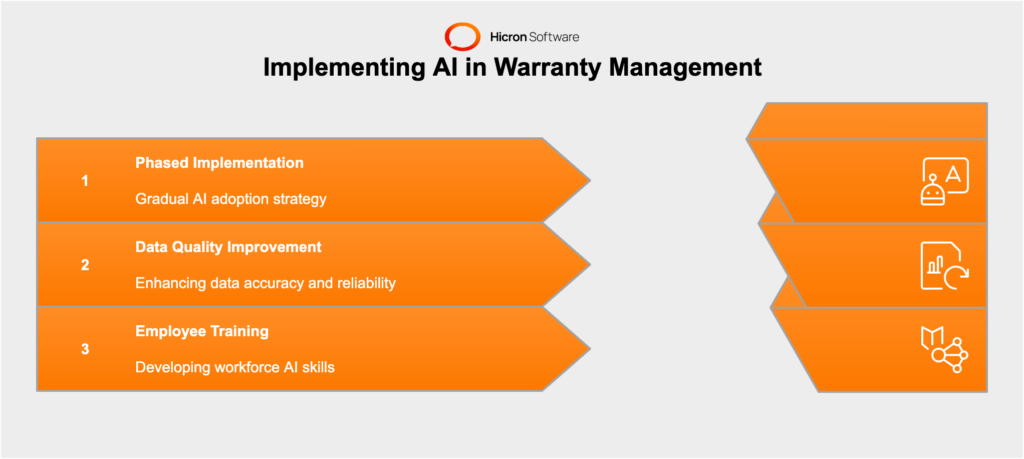
While the path to integrating AI into warranty management comes with its set of hurdles, the long-term benefits far outweigh these initial challenges. With careful planning, focused investment, and a commitment to continuous improvement, companies can overcome these barriers and leverage AI as a powerful tool in their warranty management arsenal.
The automotive industry has always been at the forefront of adopting innovative technologies to enhance operational efficiency and customer satisfaction. One such area that has seen transformation through technology is warranty management. This case study explores how Hicron, a leading technology and consulting company, leveraged artificial intelligence (AI) to revolutionize warranty management for automotive companies, highlighting the importance of staying ahead in a competitive market.
Warranty management in the automotive sector is a complex and critical operation. It involves verifying claims, managing parts replacements, and ensuring customer satisfaction while preventing abuse and fraud. Traditional methods often rely heavily on manual processes, making them time-consuming, prone to errors, and susceptible to fraudulent claims. This not only increases operational costs but also affects the overall customer experience.
Hicron recognized the challenges in traditional truck warranty management software and warranty management processes and turned to AI for solutions. By implementing AI technologies, including machine learning algorithms and neural networks, Hicron aimed to streamline and automate the warranty management process in truck warranty management software.
Implementing AI in warranty management transformed the operation from a cost center to a strategic asset. Major benefits an automotive company observed included:
An essential aspect of warranty management is how customers report issues. Customers often report faults through various channels, including online forms, phone calls, or directly at workshops. A notable challenge arises when a customer seeks service at a workshop unauthorized for specific repairs, such as battery issues, necessitating redirection to an authorized service center. This situation underscores the importance of having an efficient system in place to guide customers promptly to the right service provider, minimizing delays and enhancing customer satisfaction.
The repair process itself, managed by the service module in after-sales operations, involves detailed recording of mechanical work – from parts used to labor hours. This culminates in a job card or service work list, which is critical for initiating the warranty claim process. Here, Hicron introduced an innovation by automating the creation of warranty claims from these service reports, particularly for clients using VMS systems. Through the Dealer Business Management (DBM) Service, warranty claims can be automatically generated with a single click, dramatically reducing manual input and streamlining the process.
For clients without integrated systems like SAP VMS, Hicron developed APIs to either fully or partially automate claim creation. This technology minimizes manual data entry, enhancing efficiency and accuracy in the warranty claim process.
Auto warranty claims processing generally follows two paths based on whether pre-authorization from the manufacturer or importer is required.
This process sometimes leads to disputes over material use or labor time, highlighting the need for clear guidelines and efficient claim processing mechanisms.
The addition of customer service channels and the automation of claim generation represent best practices in managing complex warranty processes. These innovations not only improve operational efficiency but also enhance customer trust and satisfaction by ensuring transparent, quick, and accurate handling of warranty claims. Hicron’s approach to integrating AI and automated systems into warranty management serves as a model for automotive companies aiming to modernize their service offerings and maintain a competitive edge in the industry.
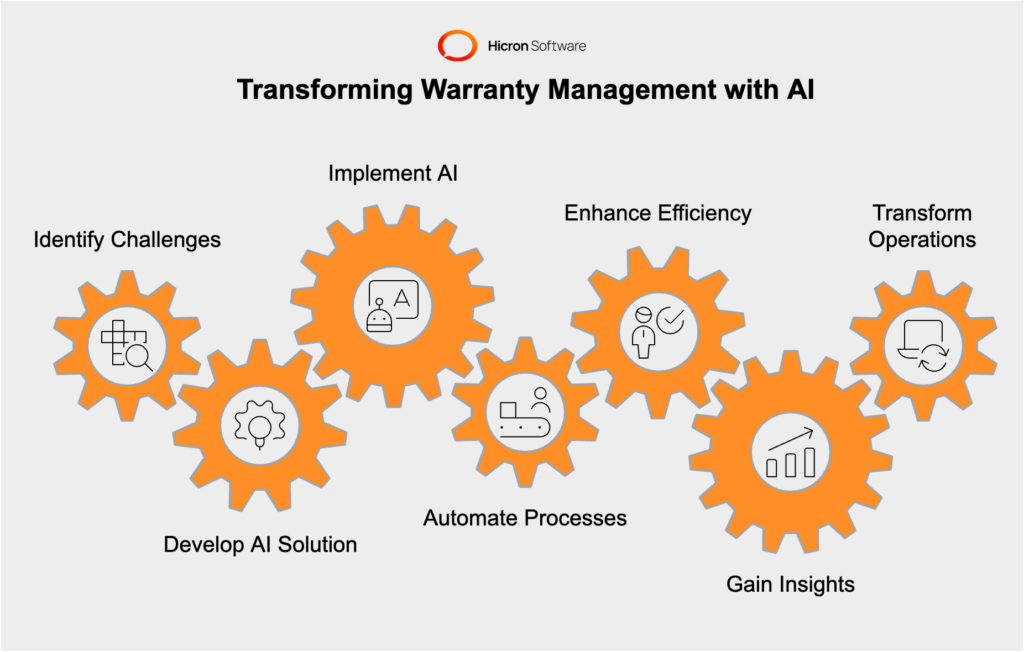
This case illustrates the power of AI in redefining warranty management in the automotive industry. By implementing AI technologies, automotive companies can not only enhance operational efficiency and customer satisfaction but also gain strategic insights for future improvements. This case study serves as a blueprint for other companies looking to leverage AI in their warranty management processes, showcasing the tangible benefits and competitive edge it can provide.
Artificial Intelligence (AI) is revolutionizing automotive warranty management by providing a suite of benefits aimed at enhancing efficiency, accuracy, and customer satisfaction. Its role extends from automating claims processing to employing predictive analytics for foreseeing potential failures before they escalate into costly claims.
This technology not only streamlines operational processes but also aids in the crucial task of fraud detection, safeguarding against financial losses through meticulous pattern analysis. Additionally, AI’s capability to optimize customer experiences by ensuring timely and accurate warranty services contributes to fostering brand loyalty and customer trust. However, the integration of AI within the realm of warranty management is not devoid of challenges. Concerns regarding data privacy and security emerge as a consequence of handling vast amounts of customer data.
The financial and temporal overhead associated with implementing AI systems poses another substantial barrier for many companies. Furthermore, the dependency on high-quality, unbiased data inputs for AI systems to function correctly introduces the risk of erroneous outcomes if the data is flawed. A notable skills gap also presents itself, highlighting the need for specialized personnel capable of managing these sophisticated AI systems.
Looking ahead, the potential for AI to continue enhancing automotive warranty management is immense. Anticipated advancements in AI algorithms, coupled with an increase in data availability, are expected to sharpen predictive capabilities, making it possible to anticipate issues with greater accuracy.
The integration of AI with emerging Internet of Things (IoT) technologies promises real-time monitoring and diagnostics, paving the way for a more proactive approach to warranty management. Furthermore, AI’s evolution is anticipated to drive a shift towards more personalized warranty services, tailoring solutions to meet individual customer needs and enhancing the overall service experience. Efficiency and cost-effectiveness are likely to improve as AI technologies mature, reducing operational costs and offering better value to both manufacturers and customers.
Despite the hurdles, the trajectory of AI in automotive warranty management points towards a future where enhanced efficiency, reduced costs, and improved customer satisfaction are not just goals but achievable realities. Get in touch!
AI automates the review and approval of warranty claims, reducing processing times and errors while increasing accuracy. It simplifies workflows, handling tasks that traditionally required more manual effort.
By using machine learning and natural language processing, AI pulls and analyzes data quickly, ensuring consistent decisions. Its automation capabilities allow faster processing and fewer human errors.
Manufacturers save time and costs, detect warranty fraud efficiently, gain insights for product improvements, and deliver better customer experiences, increasing brand loyalty.
AI uses pattern recognition and anomaly detection to spot irregularities in claims. For example, it can detect unusually high claim submissions from specific areas or discrepancies in submitted information.
Predictive analytics uses data to forecast potential product failures or high-cost claims. This allows manufacturers to proactively address issues, improving quality and reducing future claims.
Yes, AI lowers operational costs by automating repetitive tasks, detecting fraud, and enabling better resource allocation. This efficiency translates to significant financial savings.
AI speeds up claim resolutions and provides 24/7 support through chatbots or virtual assistants, ensuring transparency and convenience for customers.
High setup costs, reliance on high-quality data, and a need for specialized personnel are significant challenges. Companies must also ensure data security during implementation.
AI analyzes historical claim data, repair records, customer feedback, and product performance metrics to optimize processes and detect patterns.
By identifying common problems within warranty data, AI provides actionable insights that manufacturers use to improve product design and production processes.
Yes, humans remain essential for oversight, handling complex cases, and interpreting AI-generated data for decisions that require judgment or empathy.
Companies need to invest in AI software, IT infrastructure upgrades, data preparation, and team training to ensure effective AI implementation.
AI systems can be programmed to follow regulations, flagging non-compliant claims and maintaining detailed audit trails to support compliance efforts.
Natural Language Processing (NLP) and machine learning algorithms enable automated claim reviews, extracting relevant details quickly and accurately.
By improving transparency, speeding up claims, and ensuring fair and consistent decisions, AI enhances the customer experience, fostering trust and loyalty.
Yes, AI solutions are increasingly scalable, allowing smaller businesses to adopt targeted AI tools for specific needs without excessive costs.
Most AI solutions can be tailored to fit specific brand requirements, including compliance standards and unique workflows.
AI-powered systems have been used to detect fraud, streamline warranty approvals, and provide predictive insights for automobile recalls and repairs.
AI analyzes historical data trends and product performance metrics to identify patterns linked to failures, helping manufacturers prevent severe issues.
AI streamlines claim processing, fraud detection, and predictive analytics, benefitting manufacturers by reducing costs and dealerships by improving accuracy and customer service efficiency.
Regular data audits, standardized data collection methods, and proper data training processes ensure accuracy for AI models.
Yes, but these risks can be mitigated by implementing robust data encryption, compliance frameworks, and industry best practices for cybersecurity.
AI helps identify valid warranty claims quickly and provides dealerships with predictive insights to stock necessary parts and allocate resources.
Companies must comply with regional consumer protection laws, data privacy regulations, and warranty-specific legal standards in their markets.
Advances in AI algorithms, better integration with IoT for real-time diagnostics, and more personalized warranty solutions are expected to shape the future of AI in warranty management.
